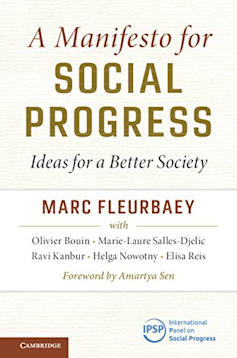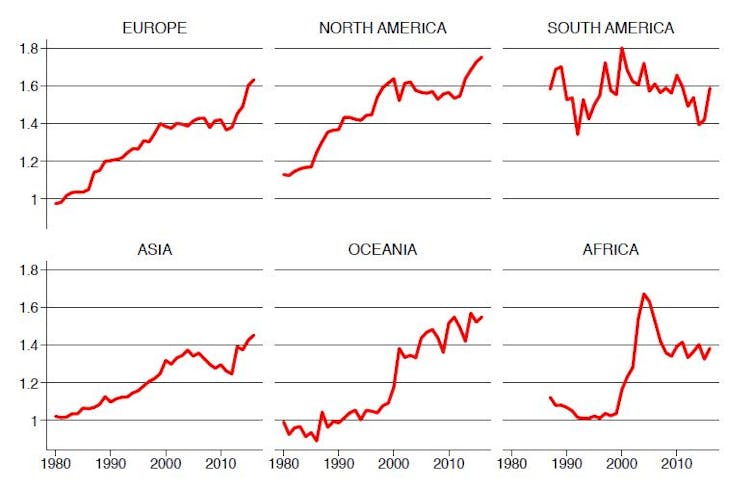Democracies in the world are being rocked by a new wave of populism. Many scholars correctly analyse the flaws in populist discourse and practices. Populist politicians stoke fears and hate, exacerbate divisions and stereotypes, and distort facts to serve their warped vision of reality. Proclaiming the goal of giving the power back to the people, they actually undermine the mechanisms of political deliberation and representation, while curbing judicial and media independence. In a nutshell, under the illusion or pretence of embodying “the people”, they capture power for their own clique.
All of that is true. But populism is currently attractive because it contains a grain of truth and responds to real anxieties that our globalised economy generates. If we want to be prepared for the post-populist period and hasten its coming, we must address these real issues.
The disenfranchised 99%
The grain of truth in populist discourse is that people do indeed feel disenfranchised and think that the elite is corrupt. Alas, these public perceptions themselves contain more than a grain of truth. There is a lot of talk about the concentration of wealth, and rightly so, but equally important is the concentration of power that has been fostered by the globalisation of the economy, the concentration of markets and the growing influence of money in politics.
Price mark-ups of corporations in world regions. The mark-up is the ratio of price over marginal cost and reflects the degree of monopoly power. It is close to 1 in competitive markets, and a mark-up of 1.6 reflects a high level of market power. J. De Loecker and J. Eeckhoudt, _Global Market Power_.
Key decisions determining people’s standard of living and employment are strongly influenced by decision-makers that have no direct connection to them: technocrats and politicians in Washington or Brussels, lobbyists, foreign CEOs with stratospheric salaries, and so on.
How was such a disenfranchisement of ordinary people possible? Let us briefly revisit history.
Beyond fascism, communism, and liberalism
Three ideologies have dominated the 20th century with a liberation narrative: fascism, communism, and liberalism. Fascism pretended to liberate the nation, as a collective, under the guidance of a strong leader, but negated the individual and did not recognise the equal dignity of human beings, up to the point of embracing mass extermination.
Communism was conceived around the idea of emancipating workers (as individuals, not just masses), but quickly morphed into a form of fascism when it came to power, with very dramatic consequences.
Liberalism, unlike the two totalitarianisms, was more securely grounded on the ideal of liberating every person, and conceived a combination of market economy and liberal democracy that has brought enormous social progress over a long period. But liberalism also failed in its emancipation project, and it is crucial to understand why.

Hitler poses for the camera, 1930. Both fascism and communism led to tragic consequences and liberalism failed as an emancipatory project. Bundesarchiv, Bild 102-10460, Hoffmann, Heinrich/Wikimedia, CC BY-ND
Historian Yuval Noah Harari criticises liberalism for having no answers to the big problems of ecological collapse and technological disruption. But its shortcomings are deeper and have always been there, repeatedly pushing disillusioned electorates into the arms of populists.
First, the market economy does not protect people from falling back into a state of dependence and subordination. Economic inequalities produce inequalities in status and power, globalisation displaces and concentrates economic power, and a free market generally produces labour market transactions in which many workers are trapped in a hierarchical authoritarian structure in which they lose their autonomy and dignity, as well as a say in key decisions affecting their livelihood.
Second, liberal democracy cannot properly embody the will of the people when it is reduced to a voting competition without suitable deliberation mechanisms and substantial citizen participation, and when globalisation concentrates power away from the national community. Using the label “democracies” to talk about countries where some form of free voting is in place but the political system does not really listen to the electorate is very inadequate, and does not help identify and address their democratic shortcomings.
Invent a new vision of emancipation
The Economist recently proclaimed that liberalism needed to be revived. But don’t we have enough of this cycle of populism-fascism and liberalism? It is time to revive, not liberalism, but the emancipatory project that communism and liberalism have both failed to advance satisfactorily, and invent a new vision of how real emancipation can be widely shared among all citizens.
To this end, we need to rethink the market and the productive firm. They generate many of the current problems (in particular through externalities and inequalities), but, well managed, they are essential to any conceivable successful society, because the market is a cornerstone of freedom and the productive firm is a key collaborative institution filling the gaps of the market. The market must be handled in a way that curbs its many failures, and corporations and all firms must be transformed into real associations of producers bringing different assets (capital, labour) together and sharing power, resources and status in a much more horizontal way than is common in the “capitalist” economy.
One can likewise imagine a new form of welfare state that fits this emancipatory project. Although the social-democratic welfare state is a proven concept that would deserve serious interest well beyond Scandinavia, it suffers from limitations which have reduced its ability to be the leading formula for the 21st century. The social-democratic recipe is a “grand bargain” between capital and labour but it does not fully address the structural imbalance in the capitalist economy.
A deeper form of social progress involves a more direct form of empowerment, requiring a welfare state that does not only accompany the formation of human capital and the determination of wages, but also seeks to enforce a more equitable power balance in all organisations at all levels, in particular in markets and firms. Such a welfare state is less about transferring resources than about granting rights to power and status in all institutions in which people are involved.
Inclusive development and innovation
Interestingly, this participatory approach is already promoted in developing countries by many actors such as the Indian Self-Employed Women Association (SEWA) and the international network WIEGO, or Gawad Kalinga around the Philippines. These examples show that this approach is not suitable only at a very advanced stage of development, but can actually help accelerate development.
Ela Bhatt, founder of the SEWA movement in India.
This participatory approach would steer technological innovation in a more inclusive direction, in particular in the choice of more labour-friendly technologies. If the key players of the economy were better internalising the human and environmental impact of their behaviour through their own inclusive governance, globalisation and innovation would naturally have a more human and ecological face. Democratic organisations also naturally have smaller gaps between the lowest and the highest wages on their payroll, thereby reducing the need for redistribution by the state. The more “pre-distribution” one has, the less redistribution one needs.
Of course, a standard safety net remains necessary because the market economy generates too much risk for individual earnings. It is a form of liberation to be guaranteed subsistence and basic services no matter what, as shown by the success of the social-democratic formula. But instead of distorting the economy by imposing a tax burden primarily on labour, the state can enhance the efficiency of the economy and protect the environment by taxing or pricing externalities and rents. This welfare state must also promote a sound division of labour in care work between the state and households, and see to it that women stop being burdened with excessive care duties.
This new democratic market economy is compatible with open borders to trade and capital investment, as is the social-democratic formula thriving in open economies.
Re-invent politics
This vision is quite the opposite of the socialist authoritarian approach. Instead of centralising power, it infuses participation through all institutions and organisations, making every citizen more involved in decisions at all levels.
The same emancipating movement would have to transform standard “politics”. Much needed reforms have to do with political funding, the media, voting rules, party formation, and the distribution of power within and between state institutions. Such reforms would separate politics from wealthy elites, curb the current trend toward polarising politics and would heavily invest in enhancing the quality of deliberation over policy.
It is also important to recognise that the quality of democratic politics and the degree of social cohesion are strongly interdependent. Working toward a more inclusive society greatly advances the cause of a better functioning democracy. Political institutions are highly vulnerable to the corruption induced by social disaggregation, and the best safeguard of democratic principles is a cohesive open society with limited inequalities.
Abandoning old ideologies
The old-fashioned opposition between pro-market and pro-government ideologies is completely wrongheaded. One needs both a vibrant market and an effective government. Each checks the other, and both need to be watched by civil society, in order to limit the effect of market and government failures and to empower people. Also, the imagined opposition between the market and the government hides the central role of the firm, which is neither a set of markets nor a public institution, but plays a key role in the fabric of society, along other civil society institutions.

Participatory Budgeting in New York. Such practices contribute to emancipation of citizens and democratic processes. Daniel Latorre/Flickr, CC BY
The traditional private firm has historically been an important factor of economic and social progress, but it has also been the source of much social hardship and of excessive negative externalities. It can be turned into a much more positive factor of social progress. Similarly, the family is a central social and economic institution that can contribute a lot to the emancipatory project.
How can this vision of a better society become a reality? A lot can be done through local initiatives. For instance, many cities have developed participatory mechanisms (Porto Alegre and its participatory budget is only one among many).
Many firms have also horizontal and even democratic management structures (check this blog for many inspiring examples), and the same can be said about shifting norms of behaviour in families, NGOs, and religious communities.
Obviously, very strong vested interests will strive to preserve privileges of wealth and power. This is why a strong grassroots movement will be essential to trigger a real change in institutions, with the state ultimately guaranteeing for everyone the rights that many will already enjoy informally thanks to local, bottom-up initiative.

Author provided
This post summarises key ideas from “A Manifesto for Social Progress: Ideas for a Better Society” (Cambridge University Press, 2018). Marc Fleurbaey, with Olivier Bouin, Marie-Laure Djelic, Ravi Kanbur, Helga Nowotny, Elisa Reis. This short book is published as a companion to the first Report of the International Panel on Social Progress (Rethinking Society for the 21st Century, Cambridge University Press, 2018).



 New York Legalizes Medical Aid in Dying for Terminally Ill Patients
New York Legalizes Medical Aid in Dying for Terminally Ill Patients  Nighttime Shelling Causes Serious Damage in Russia’s Belgorod Region Near Ukraine Border
Nighttime Shelling Causes Serious Damage in Russia’s Belgorod Region Near Ukraine Border  Japan Election 2026: Sanae Takaichi Poised for Landslide Win Despite Record Snowfall
Japan Election 2026: Sanae Takaichi Poised for Landslide Win Despite Record Snowfall  U.S. Announces Additional $6 Million in Humanitarian Aid to Cuba Amid Oil Sanctions and Fuel Shortages
U.S. Announces Additional $6 Million in Humanitarian Aid to Cuba Amid Oil Sanctions and Fuel Shortages  FxWirePro- Major Crypto levels and bias summary
FxWirePro- Major Crypto levels and bias summary  US Pushes Ukraine-Russia Peace Talks Before Summer Amid Escalating Attacks
US Pushes Ukraine-Russia Peace Talks Before Summer Amid Escalating Attacks  Nasdaq Proposes Fast-Track Rule to Accelerate Index Inclusion for Major New Listings
Nasdaq Proposes Fast-Track Rule to Accelerate Index Inclusion for Major New Listings 

































